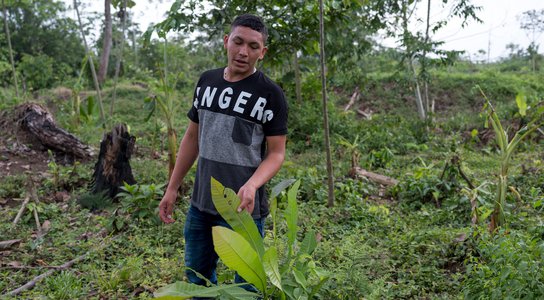Simon Roscoe Blevins (26), Richard Roberts (36) and Richard Loizou (31) will spend the next year of their young lives behind bars. Their crime? Peacefully protesting against the first major commercial fracking site in the UK.
This is the first time the law on "public nuisance" has been used to jail environmental activists in the UK since 1932. The judgement sends a chilling signal to those who try to stop projects like this one, which undeniably contribute to dangerous levels of man-made temperature rises.
Many people will be shocked by the unusually harsh penalties – and rightly so. But this silencing of people fighting to protect their environment from powerful multi-national corporations is a global and worrying trend, even as governments pay lip service to limiting climate change.
All around the world land and environmental activists are being criminalised, attacked and even killed for opposing projects which damage the environment and deny their rights to land. In 2017, Global Witness documented at least 207 murders of these activists internationally. They represent the front line in the battle for the environment. Often they are ordinary people fighting to protect their land and forests from powerful mining and agribusiness interests driven by profit at any cost.
Whilst the majority of these killings took place in Latin America, Asia and Africa, there are signs of increasing repression against environmental defenders in the UK and other countries in the global North. For example, in the US, environmental protection legislation is being weakened and anti-protest laws hardened at both state and federal level. New anti-protest bills have been introduced in 18 states since Trump came into power, many on the route of the controversial Dakota Access oil pipeline. The proposed bills employ a variety of tactics, including increased penalties for blocking roads and allowing for the seizure of protesters’ assets.[i]
The sentences issued to the UK protestors, who had prevented lorries from entering the Cuadrilla shale gas site near Blackpool, were justified by the judge on the basis that the young activists “remain motivated by an unswerving confidence that they are right”. The police complained about ‘significant travel disruption’ caused by the group’s activities, which is ironic given the defendants rightly pointed out that tens of millions of people will be displaced by climate change by 2035 and that one in four species could be made extinct by 2050.
The judgement came as the Intergovernmental Panel on Climate Change prepares to launch its new report warning that governments are nowhere near making the changes needed to limit warming to the 1.5% target agreed in Paris, and urging a total move away from hydrocarbons.
And yet the very same governments who signed up to this target, continue to back projects which will open up yet more carbon deposits to burn. It’s not hard to see why climate activists have an “unswerving confidence that they are right.”
Rather than imprisoning and vilifying environmental activists, governments should be treating them as heroes. They must support and protect these defenders, tackle the reasons why they’re forced to protest in the first place and ensure accountability when they are threatened, and in some cases, killed. Without these activists, it’s safe to say we have little hope in combatting climate change and protecting the planet for future generations.
[i] The Washington Post, (24 February 2017), ‘Republican lawmakers introduce bills to curb protesting in at least 18 states’. Available here; CNN, (25 April 2017), ‘Numerous states considering anti-protest bills’. Available here, (accessed: 20 June 2017); ‘Anti-protest bills would ‘attack right to speak out’ under DonaldTrump’. Available here.


